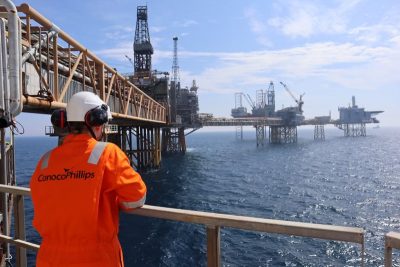The Norwegian government’s decision on Wednesday to issue new oil and gas exploration licenses in Norway’s offshore Arctic areas was being roundly condemned by environmentalists and climate activists. Among the seven oil companies involved is Norway’s own Equinor, just a week after it rolled out what’s supposed to be a new “green” energy strategy away from oil and gas.

“The government continues to press for more oil drilling in vulnerable areas,” complained Frode Pleym, leader of Greenpeace Norway and one of the loudest critics of the Norwegian oil industry. “It’s appalling that the government won’t listen to either researchers or the IEA.” The International Energy Agency recently claimed that all the oil the world can use has already been found if international climate goals are to be met.
Pleym noted that climate researchers and now the IEA have been “crystal clear” that more exploration for oil and gas also jeopardizes the climate goals Norway has obligated itself to meet. “This licensing round should have been cancelled,” he said.
He was encouraged that interest from oil companies in the new oil fields put out to bid was relatively low. Only seven companies applied for the four licenses actually granted, compared to 26 in the licensing round five years ago. Drilling in the Norwegian- and Barents seas where the fields are located is both risky and expensive, but Norway’s generous and politically controversial incentives mean that taxpayers can wind up having to pay much of the costs if wells come up dry.
Companies granted new licenses include Shell, Idemitsu Petroleum, Ineos E&P, Lundin, OMV, Vår Energi and state-owned Equinor. The latter confirmed last week that it intends to keep producing oil and searching for more, albeit on a reduced scale. Its new strategy calls for milking its most profitable and productive oil fields like the huge Johan Sverdrup field while also investing NOK 400 billion in new renewable energy projects by 2030. The goal is to turn up the tempo of restructuring Equinor from a mostly oil- and gas-based company to more climate-friendly firm with large ventures in, for example, offshore wind energy, where Equinor can benefit from its offshore expertise and experience in operating in tough conditions.
“The need for oil and gas will go down, the need for renewable energy will go up and the need for carbon capture and storage will go up,” Equinor’s new chief executive, Anders Opedal, said at last week’s presentation of his new strategy. He took over last fall after newspaper Dagens Næringsliv (DN) had revealed how Equinor had generated more than NOK 200 billion losses on its land-based oil and gas projects in the US. They’d been ushered in during when former CEO Helge Lund was keen to expand internationally with projects that also raised climate concerns at the time. Lund’s strategy is now being reversed and many of his projects dumped under Opedal.
Equinor’s new CEO is far from immune to more criticism, however, despite his new emphasis on more climate-friendly operations. Organizations like Greenpeace and Naturvernforbund (Norway’s chapter of Friends of the Earth) suspect “greenwashing” and worry that Equinor is still looking for new oil and gas sources. One of its latest in a mature area of the North Sea, however, followed the new strategy with its location close to existing infrastructure that will keep costs down. With oil prices back up over USD 70 a barrel, fields with a break-even level of USD 15 in the North Sea can become cash machines.
Opedal argues that oil revenues are still needed, also to help cover new investment in renewables. He has dropped references to growth goals for oil and gas production, though, which disappointed the stock market and sparked criticism from analysts. Opedal and his colleagues think oil production will peak in 2026 before beginning to fall steadily, leading to more profitability concern. Calls continue for Equinor to break up the company either by spinning off its renewable energy projects or its international operations, many of which also are being pared down.

Pleym of Greenpeace was less critical to Equinor right after last week’s presentation, still claiming the company is “a huge fossil” but that it has “begun to wake up” and set a new course. He was “very positive” about the proposed investment in renewables and especially offshore wind power, “but it’s a fossil that won’t listen to researchers of the IEA. We’re still worried they’re going to sink, even though they stepped on the (renewable) gas pedal.”
His organization along with Natur og Ungdom (Nature and Youth) and six young climate activists have now filed a complaint at the European Court of Human Rights about Norwegian oil drilling in the Barents Sea. After losing a lawsuit against the state at Norway’s Supreme Court, the groups now hope to convince the European court that Norway’s Arctic Oil programs violate the human rights Norwegians have for a healthy, low-emission environment.
Several political parties represented in the Norwegian Parliament also claim the state and Equinor are violating the terms of the UN’s Paris Agreement. The Socialist Left Party (SV), the Reds, the Greens, the Liberals and the Christian Democrats all want to halt more oil and gas exploration in the Arctic, as do most all party youth groups in Norway.
The Conservatives, Labour, the Center Party and the Progress Party remain keen on protecting the oil industry that made Norway a wealthy country, and they have a majority across political lines. The labour movement has even sided with Norwegian employers’ organization NHO in what newspaper Klassekampen called a “super lobby” aimed at keeping the oil industry alive to protect the jobs it generates. The government’s own recently revealed energy strategy that also protects oil has been dubbed both “embarrassing,” a “belly flop” and the equivalent of “economic suicide” in the long run, if the oil drilling and pumping doesn’t stop. For the time being, though, there’s just too much money at stake to stem the flow any time soon.
newsinenglish.no/Nina Berglund

